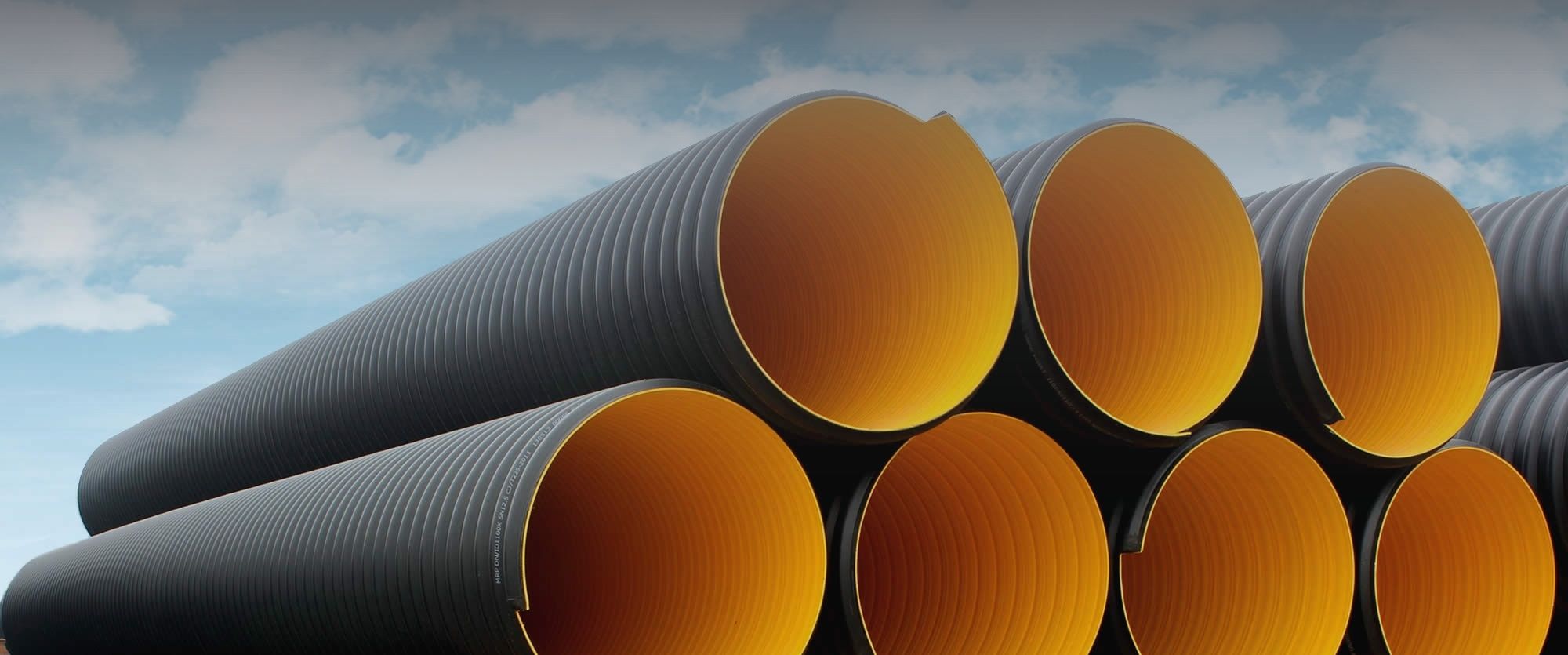

Koruge Perforated (Drainage) Pipe
Drainage pipes are special piping systems used to remove unwanted water accumulated underground or on the surface. Perforated drainage pipes feature holes that enable rapid water absorption and drainage. Thanks to their durable materials and long service life, they have a wide range of applications from agricultural lands to infrastructure projects. For detailed information on drainage pipe prices and customized solutions for your project, please contact us.
The high-density polyethylene (HDPE) raw material corrugated perforated pipe is designed to remove excess or contaminated water from underground and surface areas. These perforated corrugated pipes, which are widely preferred, are manufactured according to DIN 4262-1 R2 class standards. Upon customer request, holes are created at certain intervals on the ribs of the pipe’s outer surface. These holes assist in removing debris during maintenance operations.
Thanks to their durable structure and high water drainage capacity, Koruge perforated pipes are widely used in large-scale projects. Also known as tunnel-type drainage pipes, they are especially utilized for water drainage in highways, bridge infrastructure, and large industrial facilities. Their perforated design allows surface water to be easily collected and directed to sewage systems or designated discharge areas.
Kuzeyboru Koruge perforated pipes are produced from polyethylene (PE) raw material in accordance with TS EN 13476-1 standards. With Kuzeyboru’s broad product range, you can select the most suitable drainage pipe solutions for your project, ensuring a high-quality and long-lasting drainage system
used in various sectors and are produced with custom manufacturing techniques tailored to your needs. Applications include:
- Solid waste landfill sites
- Agricultural water drainage and unwanted water removal from fields
- Improvement of muddy and marshy lands
- Mining operations
- Infrastructure of turf sports complexes
- Protection of buildings and constructions with water at their foundation
- Roadside drainage systems
Kuzeyboru perforated drainage pipes are used in solid waste landfill facilities, while PVC perforated drainage pipes are preferred in lighter, simpler applications due to their lighter weight. When manufacturing perforated and slotted drainage pipes, Kuzeyboru takes into account the land conditions, the amount of water to be drained, project specifications, and customer requirements. Based on detailed calculations, perforation or slotting is performed according to the selected pipe type and raw material.
This approach, combined with our experience, ensures production of the most suitable perforated drainage pipes that meet project needs and customer expectations. Contact us for price lists and detailed information.

- The perforated structure rapidly drains excess water.
- Pipe diameters are produced in various sizes according to project requirements.
- Safe for use in agriculture, infrastructure, building foundations, and road drainage systems.
- Made from eco-friendly materials that ensure long service life.
- Resistant to clogging as holes are drilled on the inner side of the corrugation ribs.
- Low transportation costs and easy installation. No filter material is required in sandy soils.
- Impact resistant and designed for long-term use if installed properly.
- Flexible, lightweight, and durable. Resistant to chemicals such as solid waste, mining chemicals, and oily road runoff.
- Much lighter than concrete or metal pipes, reducing the need for heavy machinery. This also lowers transportation costs.
- Manufactured from high-density polyethylene raw material, offering high strength.
- Smooth internal surface prevents solid matter adhesion, reducing blockage risk.
- Flexible structure adapts to ground movements (e.g., during earthquakes) without cracking or deforming.
- Minimum lifespan of 50 years. Resistant to abrasion and easy to repair. Internal surface is light-colored, enabling camera inspections. Available as slotted pipes upon request.
Drainage pipe sizes vary depending on the application and project requirements. The pipe diameters are selected based on water drainage capacity. Common drainage pipe sizes include:
- 100 mm – 200 mm: Suitable for gardens, agriculture, and small-scale drainage projects.
- 300 mm – 400 mm: Used for building foundations, road drainage systems, and medium-scale projects.
- 500 mm – 800 mm: Ideal for large infrastructure projects, highways, and industrial facilities.
- 1000 mm and above: Preferred for high-capacity water drainage systems, dams, and large-scale engineering projects.
- Select drainage pipes suitable for agriculture, building foundations, road infrastructure, or industrial facilities.
- Choose pipe sizes between 100 mm and 1000 mm according to water flow requirements.
- Perforated pipes enable water drainage, while felt-wrapped drainage pipes help prevent clogging.
- High durability is crucial for heavy load projects like tunnel-type drainage systems.
- Use pipes resistant to acidic or salty water in affected areas.
- Lightweight and flexible pipes facilitate faster installation.
- High-quality materials reduce maintenance and provide long service life.
Drainage pipe prices vary according to pipe diameter, material type, and usage area. Kuzeyboru perforated drainage pipes offer reliable drainage solutions with high quality, reasonable pricing, and durable construction. Koruge drainage pipes are lightweight, low-cost, and easy to transport, making them a preferred choice in both infrastructure and agricultural drainage projects.
Our production process is carefully managed from start to finish to offer the best drainage pipe price options. Contact us to receive detailed pricing tailored to your project.

Perforated pipes are special drainage pipes with holes or slots on their surface, allowing water to enter. They are used to control water flow in rainwater drainage, agricultural irrigation, and construction foundation drainage systems.
Perforated drainage pipes remove excess water accumulated underground, directing it safely into drainage systems. They prevent root rot in agricultural fields and improve ground stability in infrastructure projects, protecting buildings and roads from water damage.
Perforated pipes collect water through holes in their surface and direct it to a drainage line. They are often wrapped with geotextile fabric to reduce clogging and perform efficiently in sandy or muddy soils.
Perforations allow water to enter the pipe and be conveyed away. This design controls water drainage, preventing flooding and protecting infrastructure such as agricultural lands, highways, and building foundations.
